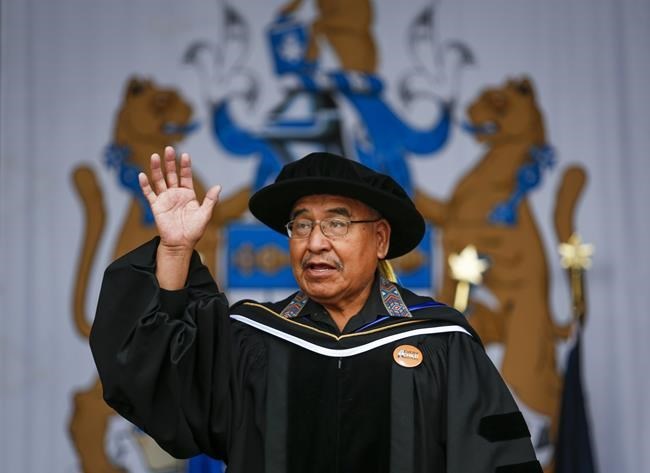CALGARY — Clarence Wolfleg remembers the day his mother took him to school.
It was 1956 and for the next 5 1/2 years he attended the Old Sun Residential School outside Gleichen in southern Alberta.
"My first memory was when my mother suited me up in my finest — my GWG denim jacket, my new pants and my little fedora hat. I said, 'Where am I going?' She said, 'We're going to go to that place.'"
Wolfleg was 6 1/2 years old. He was able to earn high enough marks to attend a public school when he was 12.
He doesn't say the name of the residential school. It's simply "that place."
Wolfleg, 72, shared some of his not-so-fond memories on Tuesday before Mount Royal University in Calgary bestowed him with an honorary doctor of laws degree for his efforts as an elder and spiritual adviser.
"It was horrible in a sense that I could not connect with my language to soothe my pain. I couldn't cry because they told me you can't cry, so my emotions was hidden inside of me," he said.
Wolfleg's mother gave some older boys "a few dollars" to protect him from some of the priests and other students. Leaving the institution is one of his better memories.
"The most happiest moment I had was when I left there and ... I wasn't going back. I looked back and said, 'Well, you didn't get the best of me. I'm still alive. My spirit is still with me."'
Wolfleg said when he first entered the school, he committed to following his father's example of joining the military and becoming a spiritual leader to his people.
He accomplished both.
Word that remains believed to be of Indigenous children were found at the former Kamloops Indian Residential School has reawakened other memories for Wolfleg, known as Miiksika'am in Blackfoot.
"I had to think about three girls that were found not even 300 yards from (my) school," said Wolfleg.
"They ran away from school and the house they went to was just a quarter mile down the road. A heavy snowstorm hit and they were found huddled on a hilltop south of the school.
"A little girl in the middle, she survived, but the other two passed away."
University president Tim Rahilly said Wolfleg has become an icon at the institution and helped many Indigenous and non-Indigenous people with his wisdom. He said the degree is the highest honour the school gives out and the decision was made long before the news out of Kamloops.
"We have been working for a long time on trying to recognize Indigenous ways of knowing and to recognize longer service of Indigenous folks in our community," he said.
"I think the emotional weight of what's happened recently is something that is on all of our minds."
The graduation ceremony was not unlike a drive-in movie. Graduates sat in their cars watching the stage.
Chancellor Dawn Farrell paid tribute to residential schoolchildren as she addressed the graduates.
"Our hearts break for them, for their family, for their communities, for all of our residential school survivors and all of our Indigenous and First Nations people."
This report by The Canadian Press was first published June 8, 2021.
___
The Indian Residential Schools Resolution Health Support Program has a hotline to help residential school survivors and their relatives suffering with trauma invoked by the recall of past abuse. The number is 1-866-925-4419.
Bill Graveland, The Canadian Press



